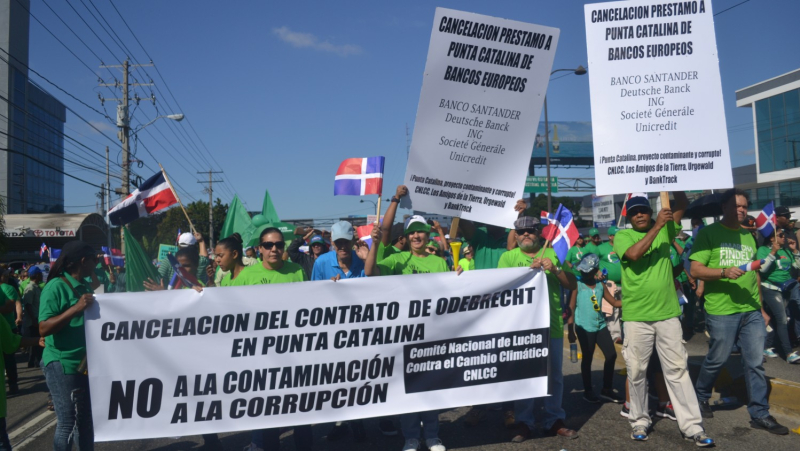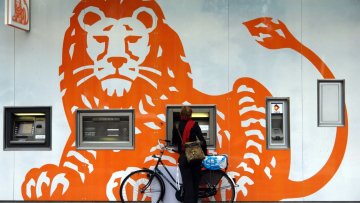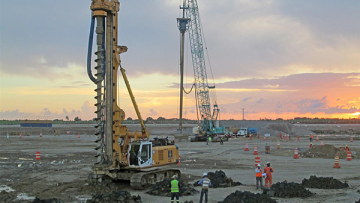Project – On record
This profile is no longer actively maintained, with the information now possibly out of dateBankTrack

Project – On record
This profile is no longer actively maintained, with the information now possibly out of dateBankTrack
Why this profile?
The Punta Catalina Power Central negatively affects local water access, local health and the climate. Besides the negative impacts of the coal power plant, the project stands out as an emblematic case of high level corruption that continues to go unpunished.
What must happen
The financial institutions involved should not condone this project as it is an emblematic case of high level corruption that continues to go unpunished. Moreover, the coal power plant negatively impacts the local environment, human health as well as the global climate.
| Sectors | Coal Electric Power Generation |
| Location |
|
| Status |
Planning
Design
Agreement
Construction
Operation
Closure
Decommission
|
| Website | http://cdeee.gob.do/puntacatalina/ |
|
|
This project has been identified as an Equator Project |
Punta Catalina Power Central, also known as the Hatillo power station, is a 770 megawatt coal power plant in operation in Punta Catalina-Hatillo, Azua, in the Dominican Republic. The initially estimated costs were USD 2 billion. The project was initiated by the Dominican Corporation of State Electricity Companies (CDEEE). The project comprises two coal power plants and includes a coal-receiving terminal for self-unloading Panamax vessels, with a maximum capacity of 80,000 tonnes, plus support facilities including a dome, conveyors, cooling and water treatment systems and an electricity substation.
Social and human rights impacts
Water access issues In a meeting at Bani City Hall in October 2014, the National Committee to Fight Climate Change criticised the government’s negligent approach to the province’s demands. They said the population lacks drinking water and irrigation, despite increased dam levels, and, instead of rationalizing it, diverts it all to the city of Santo Domingo.
Representatives complained that without irrigation they cannot plant onions. They also complained that under the pretext of solving power blackouts, the pollution from the coal power plants will pose a threat to people’s health, the environment, farming and livestock in the province.
Corruption The bidding process by which the Brazilian Odebrecht company was chosen to construct the plant was highly questionable and has been widely criticised. It is alleged that the project is overvalued by between USD 500 million and USD 1 billion, and that the money obtained in this way has been used to finance the re-election campaign of the president of the Republic, Danilo Medina. The Dominican justice system has been facing a crisis of credibility, with protests demanding the resignation of all the island state's high court judges. This major infrastructure project stands out as an emblematic case of high level corruption that continues to go unpunished.
A January 2016 article in the Dominican Today newspaper also covered these corruption allegations: "Prominent attorney Namphi Rodriguez warned Tuesday that the so-called 'hidden contract' to build two coal-fired power plants violates the Constitution and the Public Procurement Law, because it was an attempt to turn a power of attorney from president Danilo Medina into an authorization, ignoring the principles of transparency, objectivity, equality and publicity."
In late December 2016 the extent of Odebrecht's bribery activities were confirmed in a US court action where, as part of a plea bargain, the company admitted to paying officials to help secure lucrative construction contracts in 12 countries, including in Dominican Republic. An investigation into Odebrecht corruption in Dominican Republic was swiftly set up to consider the USD 92 million in bribes which it admitted to having paid out to intermediaries and Dominican officials in the period between 2001 to 2014.
With the confirmation of these long-suspected scandals, Dominican environmental group National Committee against Climate Change has called on the island state's purchasing and procurement agency to cancel the contract for the Punta Catalina coal-fired power plant with Odebrecht, and permanently disqualify it as a State contractor. The Committee's appeal to the General Directorate of Public Contracts is based on Dominican Republic's Law 340-06 which holds that if procurement-related bribes are confirmed then bidding processes must be canceled and any executed contracts are to be terminated. The same law also requires the disqualification of companies which have performed bribes, which have committed this offence in other cases or which have executives with convictions for corruption.
In June 2017, the office of the Attorney General of the Dominican Republic released a statement asserting that no bribery had taken place during the Punta Catalina tender process, but rather bribery had played a role in the securing of the legislative approval for the project’s financing: that is, Odebrecht paid bribes to two legislators in the National Congress in order to ensure the approval of financing for Punta Catalina. The USD 1.2 billion financing in question was to come from the Brazilian Development Bank and the consortium of European banks. Testimony from Marco Vasconcelos Cruz, the former CEO of Odebrecht in the Dominican Republic, has also acknowledged that a Dominican senator and a deputy were paid bribes to ensure the approval of the financing for Punta Catalina.
The project threatens to violate the basic human right to health and a healthy environment, in particular for people living in the area close to the project. The issue is all the more problematic because of the lack of clear information and assessment of the potential hazards that a coal plant project involves.
Environmental and climate impacts
The Punta Catalina and the adjacent Santa Catalina coal power plants are expected to produce 174,000 tonnes of ash and 14,000 tonnes of slag per year as waste from burning coal, as well as 30 tonnes of nitrogen dioxide and 30 tonnes of sulphur dioxide every day that will be pumped into the atmosphere, and numerous heavy metal micro-particles. On top of this, the Punta Catalina coal power plant is expected to emit 5-8 million tonnes of CO2 every year.
In December 2015, local organisations and individuals filed for an injunction in the Superior Administrative Court to halt the construction of both Punta Catalina Power Central and Santa Catalina Power Central. They argued that the plants violate Environment and Natural Resources Law 64-00 which stipulates that any project that affects adjacent areas must first have an environmental license.
The Punta Catalina power plant is financed by a USD 656 million development bank loan and a USD 632.5 million loan provided by commercial banks - each providing USD 126.50 million (Source: IJGlobal).
On December 30, 2015, a consortium of European banks disbursed USD 200 million in construction funds. According to Ruben Jimenez, the chief executive officer of CDEEE, the USD 200 million was the first disbursement of the total USD 632.5 million. In October 2016, a further tranche of USD 53.8 million was released by the banks.
Further disbursements from the consortium of European banks are unknown, though it emerged in spring 2017 that the banks involved had suspended disbursement of project finance while a corruption investigation related to the project promoter Odebrecht is ongoing. In March 2018, the lenders notified NGOs that they were awaiting the conclusion of the corruption investigation before deciding on potential further steps.
In August 2018 ING sold its share of the Punta-Catalina coal power plant (source Eerlijke Bankwijzer).
Applicable norms and standards
Intervista con Enrique de Leon sobre Punta Catalina
2020
2020-05-11 00:00:00 | Dominican Republic selling a 50% stake in Punta Catalina Power Plant
The Dominican Republic is selling a 50% stake in the Punta Catalina Power Plant. The stake was put up for sale in February 2020. By selling the stake, the government is hoping to recover a portion of the USD 2.1 billion it invested in construction while also refinancing the project. The process is currently on hold due to the Covid-19 pandemic. The Dominican Republic expects to move forward with the process after presidential electrions in July 2020.
2020-04-29 00:00:00 | Unit 1 reenters grid after being offline to correct a hydrogen leak
Punta Catalina's Unit 1 is reported to have reentered the grid on April 29 2020 after being shut down for two weeks to repair a hydrogen leak.
2020-04-24 00:00:00 | Punta Catalina Unit 2 in operation
On April 24 2020, the construction of Unit 2 is completed.
2019
2019-12-26 00:00:00 | Punta Catalina Unit 1 in operation
The construction of the first unit of the Punta Catalina Power Plant is completed.
2016
2016-02-05 00:00:00 | Group digs up more dirt on Dominican Republic coal-fired plants
According to Dominican Today: The National Committee to Combat Climate Change (CNLCC) on Friday said Dominican Republic State-owned electric utility’s (CDEEE) classification of documents on the coal-fired plants being built at Punta Catalina seeks to permanently hide the decisions by project officials from public scrutiny and from those who demand transparency.
2016-01-15 00:00:00 | 2,000 workers laid off
The CEO of CDEEE, Ruben Bichara, stated that construction contractors have laid off as many as 2,000 workers at the project, with work reduced by 98 percent. Bichara promised that new funding would materialize in a few weeks.
2016-01-12 00:00:00 | Corruption allegation
Dominican Today stated: prominent attorney Namphi Rodriguez warned that the so-called "hidden contract" to build two coal-fired power plants violates the Constitution and the Public Procurement Law, because it was an attempt to turn a power of attorney from president Danilo Medina into an authorization, ignoring the principles of transparency, objectivity, equality and publicity.
2015
2015-12-30 00:00:00 | European banks disburse USD 200 million
A pool of European banks disbursed USD 200 million in construction funds. According to Ruben Jimenez, the chief executive officer of CDEEE, the US$200 million is the first dispersement of a total US$ 632.5 million.
2014
2014-09-17 00:00:00 | First protest
The National Anti-Climate Change Committee on Wednesday announced the first protest against the construction of the coal-fired plants at Punta Catalina, Bani (south), as part of the Global March Against Climate Change to take place around the world that day.
2014-08-28 00:00:00 | CDEEE receives license
CDEEE received the final environmental license for the construction of the Punta Catalina coal-fired power plant.
2013
2013-12-11 00:00:00 | Contract is awarded
Contract is awarded to a consortium of Norberto Odebrecht, Tecnimont and Enginiera Estrella.






